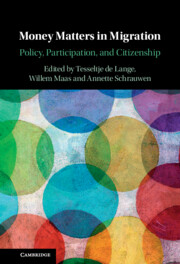Book contents
- Money Matters in Migration
- Money Matters in Migration
- Copyright page
- Contents
- Notes on Contributors
- 1 Money Matters in Migration: A Synthetic Approach
- Part I Migration
- Part II Participation
- Part III Citizenship
- 14 Millionaires and Mobility: Inequality and Investment Migration Programs
- 15 Are Citizenship by Investment Programs Legitimate? Suggesting Some Assessment Methods
- 16 Wealth as a Golden Visa to Citizenship
- 17 Divided Families and Devalued Citizens: Money Matters in Mixed-Status Families in the Netherlands
- 18 Money in Internal Migration: Financial Resources and Unequal Citizenship
- Index
- References
14 - Millionaires and Mobility: Inequality and Investment Migration Programs
from Part III - Citizenship
Published online by Cambridge University Press: 12 November 2021
- Money Matters in Migration
- Money Matters in Migration
- Copyright page
- Contents
- Notes on Contributors
- 1 Money Matters in Migration: A Synthetic Approach
- Part I Migration
- Part II Participation
- Part III Citizenship
- 14 Millionaires and Mobility: Inequality and Investment Migration Programs
- 15 Are Citizenship by Investment Programs Legitimate? Suggesting Some Assessment Methods
- 16 Wealth as a Golden Visa to Citizenship
- 17 Divided Families and Devalued Citizens: Money Matters in Mixed-Status Families in the Netherlands
- 18 Money in Internal Migration: Financial Resources and Unequal Citizenship
- Index
- References
Summary
A substantial industry has pushed forward the market for multiple citizenships. Drawing on extensive empirical research, this chapter investigates investment migration programs in practice by analyzing their constitution and evolution within a global market. This chapter identifies the underlying dynamics of supply and demand, rethinking the literature on citizenship in three areas: inter-country differences in citizenship’s benefits, privileged access for elites, and the decisive influence of third-party actors on citizenship policy. Within this theoretical landscape, the empirical analysis unpacks how these programs emerged within a broader field constituted by immigrant investor visas and discretionary economic citizenship. It reveals how this field conditioned the development and spread of formal programs, and the roles of geopolitical inequalities, industry actors, and extraterritorial rights in this change. The conclusion shows how incorporating jus pecuniae into our understanding of citizenship revises conventional assumptions in two domains: inequality and third-party actors.
- Type
- Chapter
- Information
- Money Matters in MigrationPolicy, Participation, and Citizenship, pp. 247 - 262Publisher: Cambridge University PressPrint publication year: 2021
References
- 1
- Cited by

